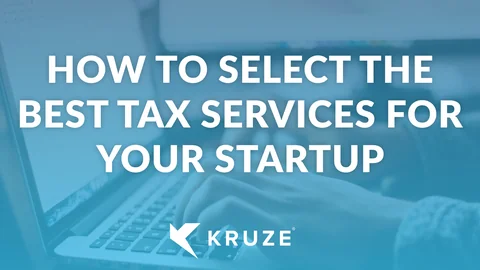
Choosing the right tax service provider for your startup is an important decision. For venture-funded companies, tax services go beyond basic compliance – they’re strategic partners that can optimize your cash flow, save you money through tax credits, and prepare you for fundraising or acquisition. So, what should you look for in a tax partner?
Key Selection Criteria for Startup Tax Services
1. Specialization in venture-backed startups. Not all tax providers understand the unique needs of VC-funded companies. Look for firms with:
- Direct experience with companies at your funding stage (seed, Series A, etc.)
- Knowledge of startup-specific scenarios like 409A valuations, cap table management, R&D credits, and exit tax planning
- Industry-specific expertise (SaaS, biotech, fintech, etc.) that matches your business model
Traditional tax advisors might not have the experience you need. Startup tax advisors specialize in VC funding rounds and acquisitions, which enables them to identify unique tax-saving opportunities that may not be available to other types of small businesses with different funding or financial situations.
2. Comprehensive service offerings. Your tax provider should offer more than basic filing. Essential services include:
| Services | Why It Matters for Startups |
|---|---|
| Tax Planning | Proactive strategies for R&D credits, QSBS, and entity optimization |
| Compliance | Multi-state filings, international tax, and investor reporting |
| Advisory | Fundraising support, acquisition readiness, and cap table health |
| Audit Defense | Representation during IRS or state audits |
Providers that only offer tax preparation don’t have the broad perspective that startups need. Your company needs a strategic partner who understands the full financial lifecycle and the startup ecosystem.
3. Proven track record with companies like yours. Evaluate potential tax service providers based on:
- Case studies demonstrating savings for similar-stage startups
- Testimonials from founders in your industry
- Experience with growth-stage events (Series A rounds, mergers, acquisitions)
- Success in claiming R&D credits for pre-revenue companies
4. Handling complexity. Your provider needs to understand how to navigate challenges specific to VC-backed startups, like:
- Multi-state operations. Employees in different states create nexus issues
- Cap table management. Proper accounting for stock options and warrants
- R&D credit documentation. Maximizing credits while maintaining audit-ready records
- Investor reporting. Preparing financials for due diligence
The Risks of Making the Wrong Choice
Mistakes can be catastrophic:
- Penalties and interest from filing errors
- Missed tax credits (R&D credits average $250K+ for early-stage startups)
- Investor concerns due to inaccurate financials
- Acquisition risks from poor due diligence preparation
Why Kruze Consulting Stands Apart
As specialists in venture-funded startups, we offer:
- Dedicated startup expertise. 100% of our clients are VC-backed
- Full-service solutions. Tax, accounting, R&D credits, and CFO advisory
- Proven results. Saved clients over $200M in R&D credits alone
- Scalable support. From pre-seed to acquisition-ready
Your Next Steps
- Assess your complexity. Document your funding stage, revenue streams, and growth plans
- Interview specialists. Focus on providers with VC startup case studies
- Verify experience. Ask about specific experience with R&D credits and cap tables
- Request references. Speak to founders at similar-stage companies
Choosing the right tax partner ensures you avoid costly mistakes while maximizing savings—freeing you to focus on building your business. At Kruze Consulting, we’ve helped startups like yours navigate these critical decisions for over a decade. Ready to optimize your startup’s tax strategy? Contact our specialists today.












